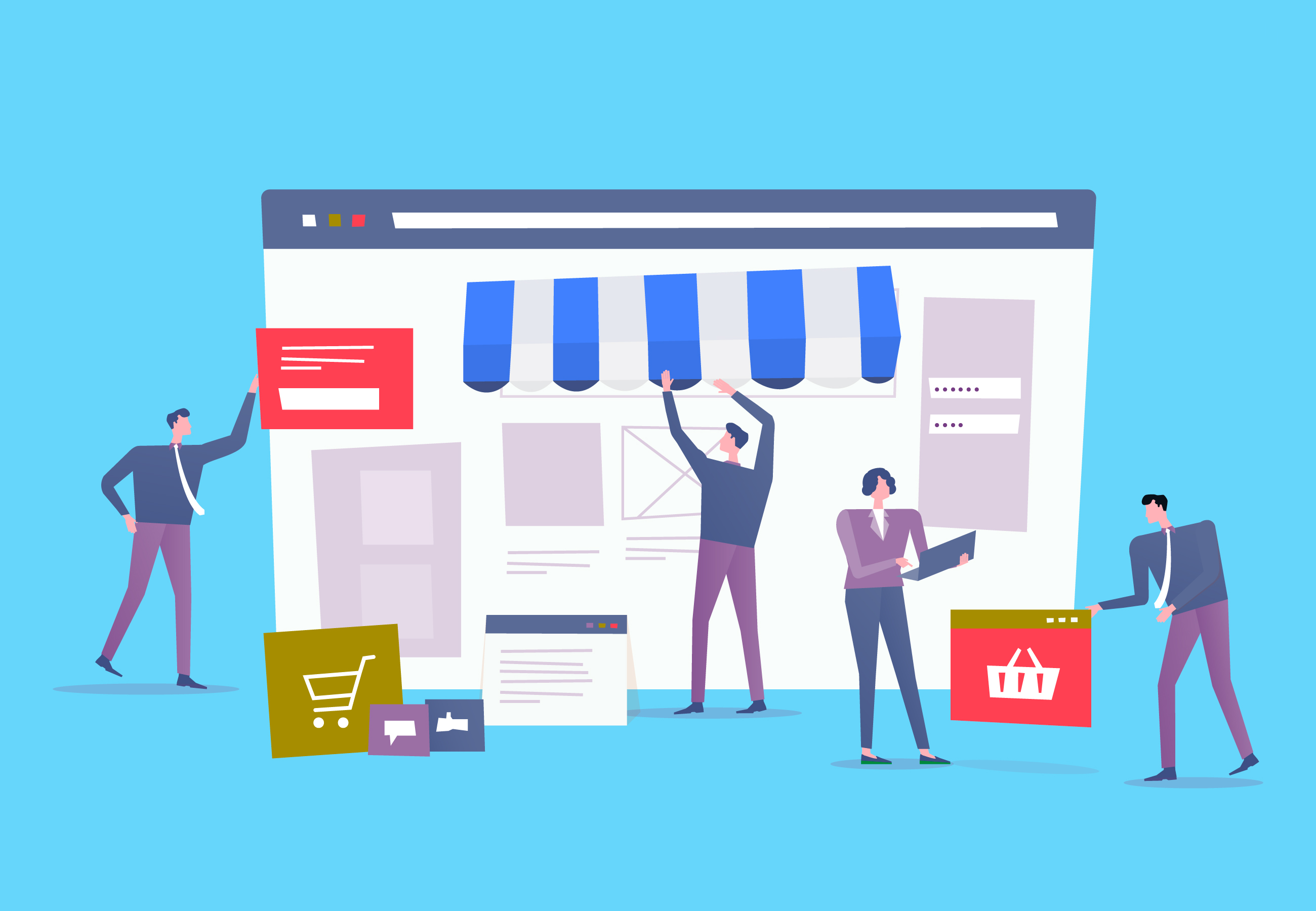If you work in ecommerce, you’ve considered social commerce, whether you knew it by its name or not.
Social commerce is the segment of ecommerce that takes place on social media platforms. It’s the process of selling online through, say, Facebook, Instagram or Pinterest. Looking at ecommerce trends moving forward, social shopping has become the modern-day shopping mall.
As interest in buying from social platforms has increased, Facebook has made it possible to conduct all levels of the ecommerce sales funnel through their platform, from discovery to purchase.
But with a million places to sell online comes a million decisions about where is and isn’t worth investing your time and money.
An Overview of Facebook Shops
In most cases, having a Facebook business page isn’t an option. It’s free, connects brands to their audience, fosters loyalty, builds awareness and is integral to being part of the social climate where brands need to exist. From your local petting zoo to promotional giant and genius Coca-Cola, every business has a Facebook business page.
Facebook Shops is something else entirely and is exclusively open to ecommerce businesses that sell physical products. With Facebook Shops, an ecommerce store can set up a shop on Facebook for users to discover, browse, save, share and buy their products.
It comes with some nifty features, like the ability to build catalogs from scratch or import them from an existing website. A Facebook shop owner can also create product collections and has some control over their store’s style, including color choice, font size and button shapes.
Overall, creating your own shop is easy to do, but there are both risks and rewards associated with doing so.
The Rewards of Selling on Facebook Shops
Greater Shopping Convenience
Consumers already use social media. They scroll through it daily and find products they’re interested in – whether by Facebook ad, friend recommendation or chance.
What’s great about Facebook Shops is that the platform accommodates all stages of the buying journey. Users can discover your products, browse through your offerings and make an order all without leaving the app.
It’s convenient.
And convenience breeds sales.
One of the core components of UX/UI design is efficiency. The fewer steps it takes to complete a task, the more likely a user is to do so. It’s why using ecommerce user flows can increase customer acquisition and average order value.
It’s worth noting that you get to choose whether buyers complete the checkout process in Facebook, messenger or through redirection to your website. In-app purchases usually require the fewest steps, but getting users to your website can be crucial for building your brand awareness and data collection. (More on this in risks).
Increased Reach
This one’s simple, so we’ll keep it short.
It’s no secret that Facebook is a mountain of audience-capturing opportunities. At the end of 2020, the platform had 2.8 billion active monthly users. Since Facebook acquired Instagram and integrated the two platforms’ shopping capabilities, its reach appeal has only grown.
Shopping in a social environment also encourages leads to share products with their friends, making it easier to reach new (and relevant) eyes.
More Data, Better Targeting
If you’re familiar with Facebook’s data collection, it should come as no surprise that the company also acquires data from Facebook Shops.
For ecommerce stores, this is excellent news because Facebook’s advertising algorithm accounts for data collected on users who interact with your products. More accurate data means more successful targeting for anyone investing in Facebook ads.
Live Shopping
Video is cherished for its ability to capture user attention, retain it and create stronger brand-consumer connections.
Taking advantage of this, the live shopping functionality of Facebook Shops allows sellers to showcase and sell products while livestreaming. Why not just livestream the same way you can from a regular account?
The benefit of the Facebook Live Shopping tool is that you can select products and collections from your shop to feature during your livestream, making your production appear more professional and an impulse purchase easier to complete.
Testing and Integrations
No matter how we feel about Zuckerberg, Facebook understands the significance of testing before implementing. When you create a Facebook shop, you can also create a Commerce Test Account. This account operates as a stunt double for practicing all your tricks. You and anyone you add can test various functions, including shop styling, order management features and integrations.
Integrations work via Facebook Commerce APIs. Facebook Commerce APIs allow you to “integrate your Commerce account with your inventory and order management system programmatically to manage products and inventory and orders.”
An ecommerce platform’s ability to integrate with the third-party shipping software you use for inventory management, order processing and shipping is integral to customer experience (CX) and business efficiency.
The downside to Facebook’s integration capabilities is that you will likely need your developer’s help setting them up. Facebook requires that you test any app you want to integrate on a Commerce Test Account. Afterwards, you still need to complete an App Review to obtain permission to use the app.
Being Social
Capitalizing on the nature of social media, Facebook gives leads and customers the option to reach out to your businesses through Facebook Messenger, WhatsApp or Instagram Direct.
While you may allow leads to reach out to you through your website, potential buyers may find reaching out on a social platform that they’re familiar with to be more comfortable. The fast, convenient essence of social also encourages leads to reach out with product questions and hesitations they may not otherwise be inclined to ask on a website. The caveat here is that you have to respond quickly or you risk losing to consumer impatience.
The Risks of Selling on Facebook Shops
Little Control Over Customer Experience
Anytime you sell your products on a platform you don’t own, you forfeit control over your customer experience.
Facebook Shops may permit some customization, but UI design is about more than color choice and button shape, and CX is about more than design. On another’s platform, you lose the ability to provide certain features and handle bugs immediately.
Control over CX also impacts the strength of your brand. It’s hard to convey your brand and maximize your sales strategy in a limited environment, and all brand touchpoints contribute to consumer’s perceptions.
Website Losses
When you sell on Facebook, Facebook gets your traffic and data.
By giving more of your traffic to Facebook, you don’t receive the full benefits of customers using your website – like leaving a strategized impression and maximizing your data. User data is crucial to growth, as is utilizing your own brand and digital environment.
Although sellers who use Facebook’s Commerce Manager can see data Insights that provide helpful information, many valuable metrics are still in development. It also isn’t as much insight as you can obtain through Google Analytics or other ecommerce tools that work through your website, like Crazy Egg.
Being Babysat: Having to Follow the Rules
On another’s platform, you also have to follow their rules. These rules can dictate your products, selling strategies and process management. For example, your shipping options play a key role in dictating your CX, and Facebook has specific rules about shipping processes that sellers have to obey.
Often, rules benefit customers, but they can still become annoying or disrupt your ideal process. In the worst case, breaking the rules means facing account suspension or shutdown, whether you broke them intentionally or not.
Social Commerce Creates Dependencies
When you create a Facebook Shop, it’s important to recognize that you’re hiring a business partner – and one you rely on for the functioning of your business even though you don’t have their direct contact information.
Facebook has customer support reps, but when dealing with a multi-layered company, it’s not unlikely that you’ll get passed around, put on hold or told that “we’re working on it.” This can be stressful and downright damaging when you depend on their developers to manage any bugs that come up on their end. While you wait, acquisition opportunities won’t.
Nothing Is Free
Right now, Facebook charges 5% per transaction on sales over $8.00 and a flat fee of $0.40 for shipments of $8.00 or less. The cost adds up over time, and whether it’s worth the growth opportunity available through Facebook depends on many factors unique to your ecommerce store.
If you decide that Facebook Shops is an appropriate strategy for your ecommerce business, be sure to prepare for future price jumps. Service costs rarely remain the same over time, especially as more businesses rely on those services.
There Is Power In Ownership
Facebook Shops can be a great tool for increasing the reach of your products, refining ad targeting and creating a convenient buying experience, but it’s not for everyone.
More importantly, it’s not meant to be the primary tool for anyone. Facebook selling is meant to support your ecommerce store, not replace it. Your ultimate goal should always be to use Facebook as a source for acquiring leads for your website.
Your territory is where you have the most control, and it’s where you can get the most out of your data and brand to grow your customers’ lifetime value.


